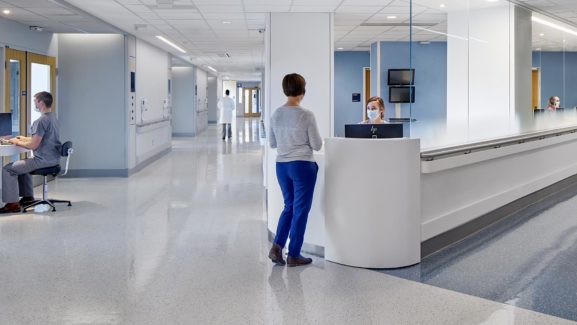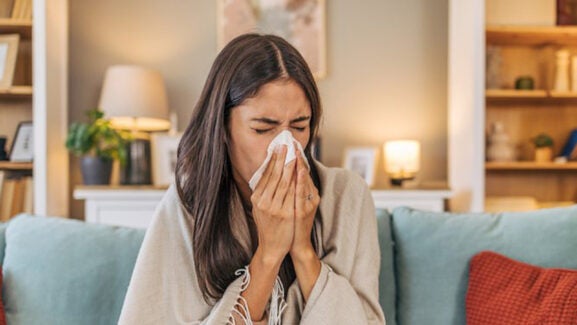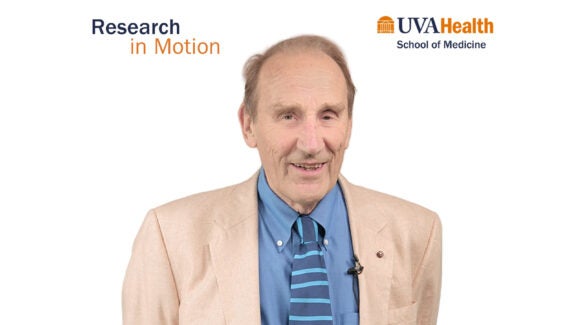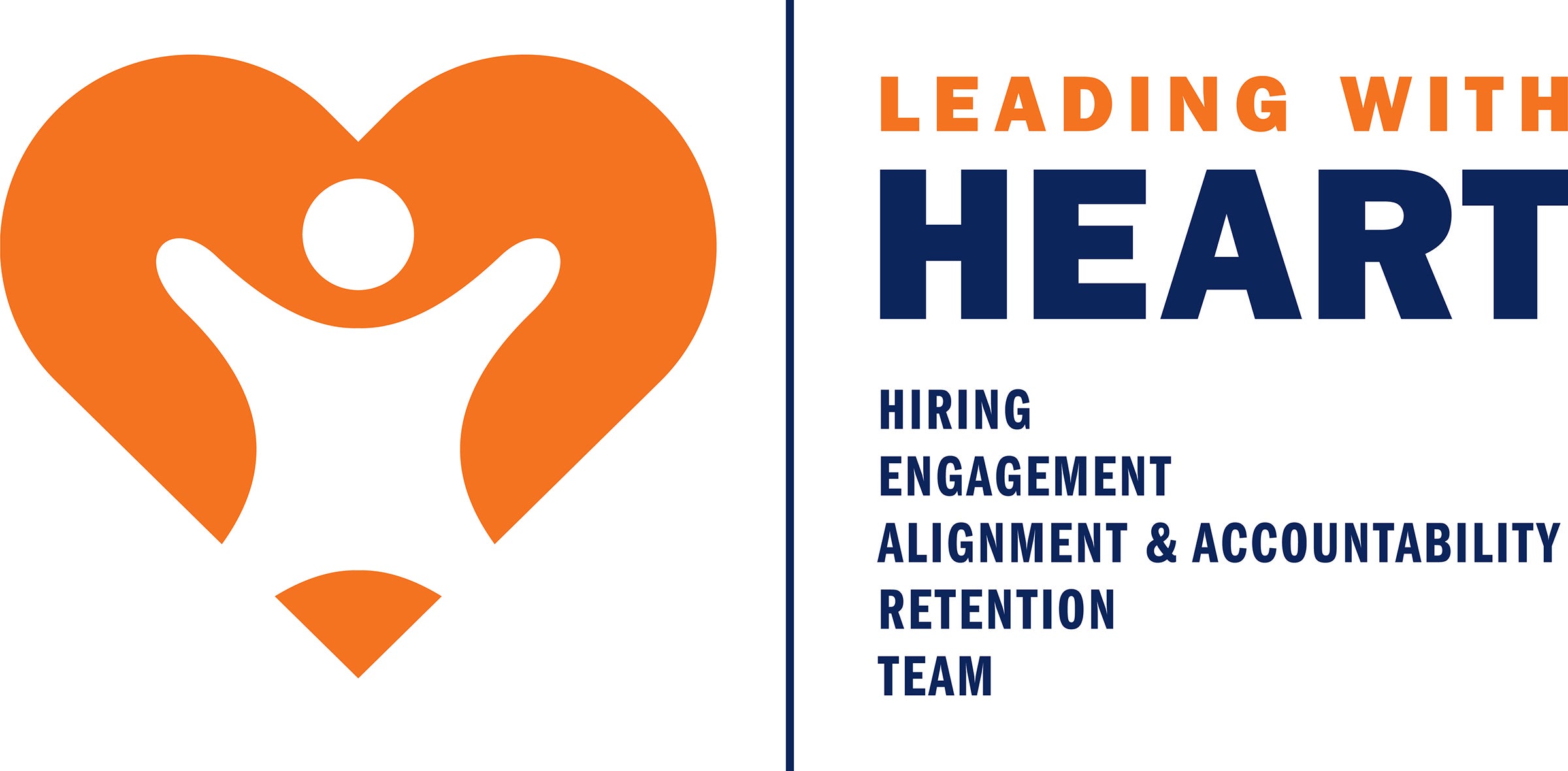
TJ Lovdal Advocates for Nurses’ Mental Health by Sharing Her Own Journey
After 10 years in the Intensive Care Unit, Clinical Program Coordinator Theresa "TJ" Lovdal was attacked by a patient in February 2019. Thankfully, she wasn’t physically hurt and returned to work immediately. But within a few weeks, she experienced frightening episodes during which her heart would start pounding and she would be out of breath and dizzy. “I was struggling,” Lovdal recalls. “I could barely make it through a shift. It was really difficult for a while.”
Thanks to the advice of colleague Kris Blackstone, Lovdal met with a counselor through FEAP [Faculty and Employee Assistance Program] to talk through her feelings. “I sobbed most sessions,” she recalls. “I learned I had experienced other people's trauma for so long and had not processed it or let it out. Just understanding the science of what was happening and why my body was feeling that way was so healing for me.”
The Ripple Effect of a PTSD Diagnosis
Since being diagnosed with post-traumatic stress disorder (PTSD), Lovdal has been open about her mental health journey. In 2020, in the midst of the pandemic, as president-elect of UVA’s Nursing Professional Governance Organization — she brought her experience to a night shift committee meeting. Leadership was asking for ideas on how to help nurses. She suggested mental health supports. That meeting began what is now a robust, well-being tracking program proactively connecting nurses to FEAP.
Lovdal even shared her story in front of thousands of nurses at the American Nurses Credentialing Center (ANCC) National Magnet Conference in October 2021, presenting alongside Luella Glanzer, Nursing Professional Practice Project Management Specialist, on the well-being tracking program they started at UVA Health. In her portion of the presentation, Lovdal featured a quote from Kate Judge, executive director of the American Nurses Foundation (ANA), about the importance of nurses’ physical and psychological health.
Little did Lovdal know — Judge was in the audience. “She came up to me after the presentation and introduced herself,” recalls Lovdal. “We were all crying. It was so sweet!” Judge shared that the ANA wanted to partner with a nurse who was willing to open up about their mental health struggles, and wondered if Lovdal was interested. She was. “I needed care and treatment for a long time before I really sought it out,” she explains. “As nurses, we aren’t very good at even admitting we have mental or emotional health issues. I am willing to be awkward.”
Though she was always a little embarrassed being known as an “oversharer,” Lovdal is now grateful. Her ability to be vulnerable has had a ripple effect, opening opportunities to help others — allowing her to become an outspoken champion for mental health care — whether through FEAP or another resource.
A Chronic Issue Requiring Preventative Care
Lovdal is open about how she still experiences the effects of PTSD and feelings of anxiety. “It’s not all puppies and rainbows and butterflies,” she says. “If I’m driving home and somebody swerves off the road, that may stimulate a brief adrenaline rush that also affects me — hours later. It’s a chronic thing I have to deal with, but now I have the tools to recognize what I’m feeling, and am able to pull myself out of it.”
Now, Lovdal’s story will have even more impact. ANA will follow her with cameras and microphones to capture a “Day in the Life” of someone who represents many nurses around the country and is willing to share her story. The end result: a video shown far and wide as part of ANA’s Well-Being Initiative to support the mental health and resilience of nurses.
Lovdal hopes the video will continue to amplify her message that mental health is a journey, and one we should all be intentional about. “As healthcare providers, we see really hard stuff and are at high risk for mental health concerns, so we should be getting preventative care,” says Lovdal. “I want to help make it normal to get mental healthcare.”
To contact FEAP: call 434.243.2643 or schedule an appointment online.
Latest News





Thank you for sharing your story.
Your bravery and willingness to share and encourage others is commendable.
TJ you are an amazing leader! Thank you for being vulnerable and bringing attention to mental health issues that affect our health care professionals especially our nurses. You rock!
TJ, Thank you so much for all that you are doing for the nursing profession!
TJ, there are no words to describe how proud I am for you not only openly sharing your story, but for being such a kind, caring advocate for our nurses! I am so honored to be your friend!! I love you xo
TJ, your love and compassion for others is an overflowing blessing for us all. Thank you for your courage and willingness to be vulnerable. You are truly an amazing person!
Thank you TJ for giving us all permission to be vulnerable to take care of ourselves and each other. You are leading the way!
Thank you for sharing TJ. I always saw you as a totally together and engaged nurse. I hid my anxiety and struggle to cope for many years. Retiring from patient care and embracing that I was not in control helped. You are an amazing nurse and, more importantly, person.
I appreciate and value you, Ms. Lovdal.
Sharing these personal stories is essential to normalizing the universal human experiences of depression, anxiety, PTSD, etc. While difficult to go through, familiarity with these challenging emotions render us more compassionate and empathic, important qualities to nurture.
Thank you!
This is a great story to read and I am glad we have resources to help! I think it would be even better if this article linked to the UVA FEAP Webpage or listed the phone number also so that people can call and get help right away.
“Thanks for the suggestion, Daniel! We’ve updated the copy to include information for team members to access FEAP resources.”
Your capacity to embrace your vulnerability is admirable and I hope will serve to light the way for others who may need help. Thanks for all you have done and will do for others my friend.
TJ, Sharing your story is a wonderful way to help so many others going through a difficult time. No nurse should have to face what you did, but it unfortunately happens. Knowing there is help and how to reach out makes a difference. Thank you for your courage and leadership!!
TJ- you a special person and thank you for sharing your story. You will help others by sharing this personal experience. I am so glad we had the opportunity to work together. Sending you a big hug.
TJ your transparency and ability to share this is so Welcome! I am so appreciative that you are working with our International Nurses and can support them as they come into the US, Cville, and UVA.
You are great!
TJ thanks for leading the way so beautifully. Thanks for sharing your story so that we can continue to blaze a new trail to support nurses now and in the future. Hopefully taking care of our mental health will start to be a priority not only for us as individuals but also for our health care systems to build strong systems to support their nurses.
TJ, thank you for having the courage to share your story. You are an inspiration to us all!